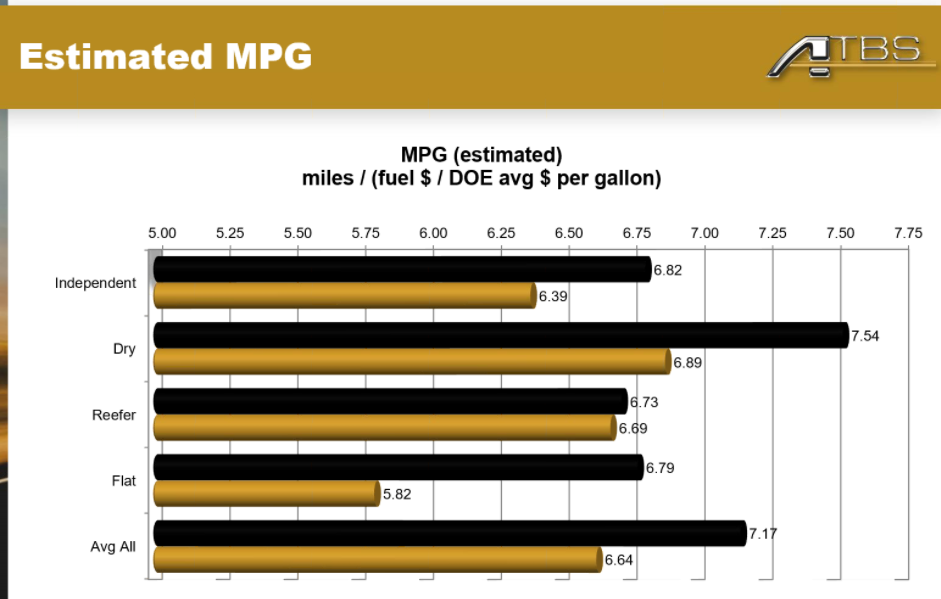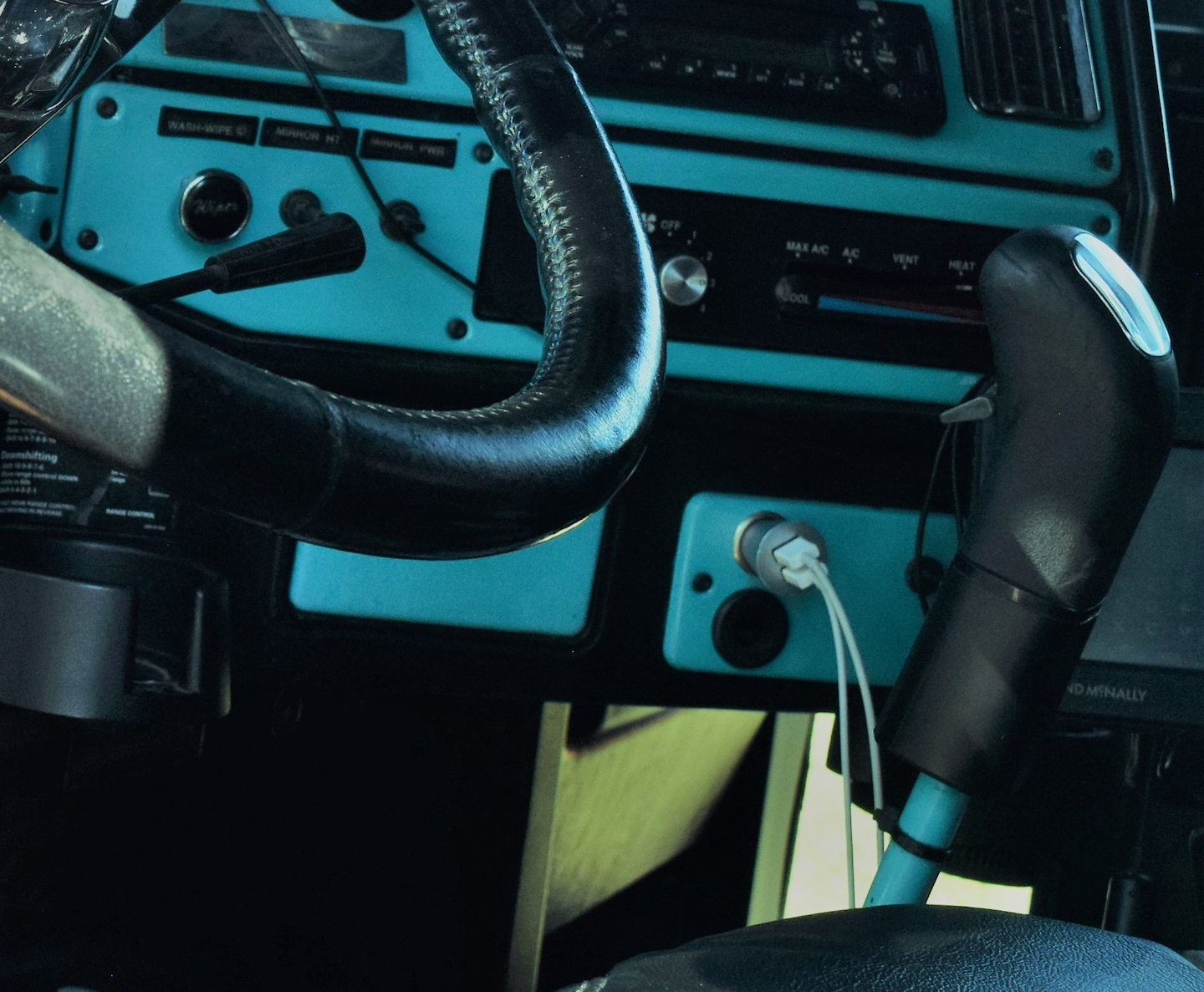The ATBS business services firm's big annual conference call with their owner-operator clientele and owners outside their network – yes, it's open to you, too – is Thursday late afternoon, at 5 p.m. Central time. Come armed with your own numbers when it comes to costs, revenue and income across the board and it'll be a chance to benchmark your own performance for year 2020 against the averages ATBS computes from among its tens of thousands of clientele, in dry van, reefer, flatbed and a big specialized segment, too.
A bit of sneak peek into what's in store for the call was on offer yesterday in a presentation ATBS President Todd Amen gave for ATBS fleet partners who rely heavily on lease agreements with owner-operators. Among the slides he shared was the following, offering a 2019 v. 2020 comparison of average fuel mileage for owner-operator clients in these segments (2020's mileage averages are represented by the black bar):
 All segments were able to boost mileage last year, flatbed by almost a full mile per gallon. (Note: The 'Independent' segment includes not only clients operating with carrier authority but also some clients who might be leased with a small fleet that doesn't have its own relationship with ATBS.)
All segments were able to boost mileage last year, flatbed by almost a full mile per gallon. (Note: The 'Independent' segment includes not only clients operating with carrier authority but also some clients who might be leased with a small fleet that doesn't have its own relationship with ATBS.)
The apparent gains are remarkable in a few different ways, but chiefly to my mind they might well serve in a sideways sort of way as another big reminder of the value of highway-infrastructure investment in our society. How do I get there? Here's what Amen had to say about the gains, to start.
When Amen and number crunchers at ATBS realized fuel mileage had gone up even as fuel costs had been way down over much of 2020, it "didn’t make sense," he said, as owner-operators have a tendency to "drive faster when fuel is cheap" as a general rule, slowing down when prices are up to make the most of the resulting fuel mileage gains.
"Why would fuel mileage go up" in such an environment? he asked.
The answer Amen found in traffic reductions that were generally on offer through a great deal of the year. In 2020, "we had the most efficient highway system we’ve ever had. ... Drivers weren’t slowed down and weren’t stuck in traffic on the rural highways" at nearly the rates of the immediate past.
Conversations with owner-operator clients bore this out, with some who might have in the past driven in the wee hours when possible to capitalize on the traffic reductions noted they drove for much of the year during daylight hours without experiencing frustrating delays nearly as regularly.
As a result, efficiency was maximized, boosting fuel efficiency itself considerably.
The Biden administration unveiled some of its infrastructure plan hopes this morning, looking for a $2 trillion investment over the next decade in all manner of project areas, not just roads/bridges, which comprise not even 10% of the spending by some estimates. Incentive programs to spur the adoption of electric-powertrain vehicles, for instance, by this analysis, end up costing taxpayers more than the investment the plan looks to put into the highways those vehicles (of all stripes) might run on.
If owner-ops' 2020 fuel-mileage gains in an artificially-made-more-efficient system are any indication, though, a better investment in highway system capacity could well yield some of the tangible environmental benefits so many use to tout electric powertrains.
It's a thought.
[Related: Don't let the push toward electric powertrains turn into a 'green monopoly']
How was your fuel mileage last year compared to the prior year? Do ATBS's average results above square with what you saw?
 What's your choice for the transmission. Read a engagement/safety case for manual shifting in the context of ever-increasing automation via this link.Reviving the old manual/automated-transmission training debate?
What's your choice for the transmission. Read a engagement/safety case for manual shifting in the context of ever-increasing automation via this link.Reviving the old manual/automated-transmission training debate?
The ship has sailed on this some time back, in some ways – many Overdrive readers' views on the state of things when it came to a transmission transition in driver training back in 2014 were pretty well summed by the linked story's headline, which read in part: "If you can't shift, you can't drive!" It capped some debate among schools and fleets about the automatic-only "E" CDL endorsement, allowed for a driver trained only on an automated transmission.
Enter this scene, painted by a small fleet owner reader out of Pennsylvania in a message that showed up in my inbox just a several hours ago with the contention that too many younger CDL drivers seem to approach trucking and trucks like they're out for nothing more than a Sunday drive in a four-wheeler, or worse: "Tonight coming across 80 east in Pennsylvania I passed an [insert very large carrier's three-letter name here] truck and the kid was watching a movie on his tablet while driving and I might add he was in a day cab. It's one nightmare out here with these kids and their attitudes -- 'I'll do what I want.' I feel that it's mandatory that your training will be on a manual transmission and you must spend one year as a team driver (with a trainer) if you want an automatic transmission."
[Related: Most owner-ops opposed to allowing an interstate option for under-21 drivers]
As the reader pointed out, and as was also a big part of the discussion back in 2014 and periodically since then, automated transmissions seem attractive as a carrot for fleets who have a hard time attracting the very best among CDL drivers, or anybody else. From the point of view of Jim Kennedy, though, training on such a unit felt back then like it missed the point of what the operator fundamentally needs to be able to do with an 80,000-lb. rig at high speeds in the most elemental sense: "In my opinion, a driver who is unable to drive [without an automatic transmission] is not in control of their vehicle. Simple and to the point. The truck manages what gear the vehicle is in, because the driver is unable to do so. Management purchases automatics to allegedly save money and to give back to the drivers, right? Maybe it’s time we re-think some points…”
All of which is to say nothing about the current push among the tech-forward types toward full truck automation, though I guess I can imagine what you might say about that, eh Jim?
[Related: A case for manual shifting, for more (not less) automation, for engagement on the long road]
from Overdrive https://ift.tt/39v1v3H



Sourced by Quik DMV - CADMV fleet registration services. Renew your registration online in only 10 minutes. No DMV visits, no lines, no phone mazes, and no appointments needed. Visit Quik, Click, Pay & Print your registration from home or any local print shop.

No comments:
Post a Comment